
The lottery has long been associated with the United States. Since its first use in 1890, all but two states have legalized the lottery. Despite various scandals in the 1830s and 1840s, lottery activities exploded onto the national stage less than forty years later. In 1890, Colorado, Florida, Indiana, Kansas, Missouri, Nebraska, Oregon, South Dakota, Virginia, and Washington state began running their own lotteries. The lottery also began in New Mexico and Texas in the late 1800s.
The lottery is a game of chance in which players choose a group of numbers from a set of 49. These numbers are then randomly drawn, thereby awarding prizes based on the amount of numbers matched. A lotto ticket includes a unique serial number, composed of alphanumeric and digits, which the game operator uses to track and account for tickets. This number may also contain other information about the ticket’s validity.
The lottery has been used as an alternative to taxation, but is not particularly beneficial from a fiscal standpoint. It does not generate the same level of revenue as other tax sources and is perceived as an unnecessary luxury. In the United States, it has been used to subsidize public programs and sectors, and it has largely been deemed politically expedient because it does not involve a great deal of money. If it is used for good causes, however, it can be an excellent way to raise public funds.
Another method of circumventing the lottery’s security is to glue winning numbers onto the back of a ticket. Another method, called wicking, uses solvents to force lottery numbers through a layer of opaque material. This method has been used for decades. In California, a judge awarded the winning lottery player 100% of the money plus attorneys’ fees. This means that the lottery winner received more than his fair share of the prize. So despite winning the lottery, many lottery players are still unable to use their newly acquired wealth.
European lotteries were first recorded in the fifteenth century. While Italian lotteries began as a means of raising funds for their own defense, French lotteries were mainly used to help the poor. Francis I, the ruler of France, permitted lottery games in several French cities between 1520 and 1539. These early lotteries were popular, and helped finance the construction of several American colleges. Moreover, private lotteries began to spread, originating in the United States and England. In 1747, Yale received a license from the Connecticut legislature to run a lottery worth PS3,200.
In 2006, U.S. state lotteries sold a total of $57 billion, up 9% from the previous year. Moreover, every state reported a higher level of sales in 2006 than in 2005. Florida and New York led the nation with nearly $4 billion in lottery sales. The three largest lottery states accounted for 27% of the total U.S. lottery revenue. A total of seventeen states had lottery sales over $1 billion in FY 2006.